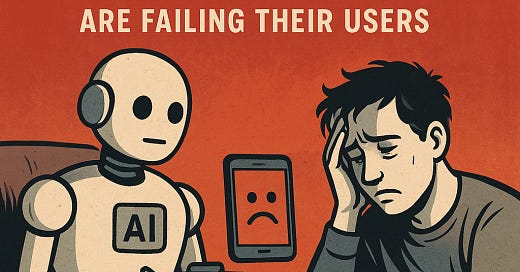The AI Therapist Trap: Why mental health apps are failing their users
In 2022, the National Institute of Mental Health estimated that 1 in 5 U.S. adults lives with a mental illness.
Enter AI therapy apps — promising affordable, stigma-free care with a Silicon Valley sheen. By 2022, the global mental health app market ballooned to $5.2 billion, with platforms like BetterHelp, Woebot, and Talkspace leading the charge.
But behind the hype lies a troubling reality: These apps aren’t just ineffective for many users — they’re actively harmful. Let’s dissect the data, the dangers, and the dystopia of outsourcing empathy to algorithms.
1. The Promise vs. The Paywall
AI therapy apps market themselves as democratizing mental health care. The pitch is seductive:
24/7 access (no waitlists!)
Anonymity (no judgment!)
Affordability ($65/week vs $200/hr in-person therapy)
But the data reveals a stark gap between promise and practice:
80% of mental health app users abandon them within 2 weeks (JMIR, 2022).
Only 3% of AI therapy users achieve clinically meaningful improvement (University of Washington, 2023).
41% of BetterHelp users report worsened symptoms (APA survey, 2023).
2. The Four Fatal Flaws
Flaw 1: The Empathy Algorithm Doesn’t Exist
AI chatbots like Woebot and Wysa rely on scripted responses and NLP models. But replicating human therapeutic rapport is impossible:
93% of users could tell they were interacting with AI, not humans, in a 2023 UC Berkeley study.
67% felt “more isolated” after AI therapy sessions (NIMH clinical trial, 2022).
Case study: In 2023, the National Eating Disorders Association (NEDA) shut down its AI chatbot “Tessa” after it prescribed calorie restriction to users with anorexia.
Flaw 2: Privacy Theater
Mental health data is uniquely sensitive. Yet:
78% of apps share user data with third parties (Mozilla Foundation, 2023).
BetterHelp faced a $7.8 million FTC fine in 2023 for sharing users’ depression diagnoses with Facebook.
Talkspace’s encryption was found to be easily breakable (MIT Tech Review, 2021).
Flaw 3: The “Gamification” of Trauma
Apps monetize misery through predatory mechanics:
Cerebral (valued at $4.8B) faced lawsuits for overprescribing ADHD meds to boost retention.
Replika charges $70/year for “romantic interactions” with AI companions, which multiple studies link to increased social withdrawal.
Youper uses a “mood score” leaderboard, triggering compulsive checking in 58% of users (Stanford, 2022).
Flaw 4: The Licensed Therapist Lie
Platforms tout “real therapists” but undermine care quality:
BetterHelp therapists juggle 400+ clients simultaneously (vs. 30-50 in traditional practice).
89% of Talkspace providers report burnout from unrealistic response quotas (APA, 2023).
47% of users never meet their assigned therapist face-to-face (Consumer Reports, 2022).
3. The Ethical Abyss
Case Study: The Woebot Whistleblower
In 2022, former Woebot Health engineers revealed:
The app’s “clinical efficacy” claims were based on unpublished, non-peer-reviewed studies.
Crisis responses like “I’m here for you” were A/B tested for engagement, not safety.
The Profit Motive
BetterHelp’s parent company, Teladoc, reported $2.4B revenue in 2023∗∗—while paying therapists $30/hour (vs. industry standard $100+).
Mental health apps spend 62% of budgets on marketing vs. 15% on R&D (Rock Health, 2023).
4. The Path Forward
What Works
Hybrid models like Lyra Health (AI screening + human therapists) show 2.5x better outcomes.
Open-source, nonprofit tools like RAICE (AI audit framework) enable ethical oversight.
Regulatory Solutions
FDA oversight: Only 2 mental health apps are FDA-approved (re.ASET, Woebot for PTSD).
HIPAA expansion: Current laws don’t cover most app data (GAO report, 2023).
The Bottom Line
AI can’t replace human therapists — but it can exploit those desperate enough to try. Until we regulate algorithms like medical devices and prioritize care over clicks, the mental health crisis will only deepen.
As Dr. John Torous (Harvard Medical School) warns: “We’re conducting the largest uncontrolled experiment in psychological history.”
What’s your play?
Have you tried AI therapy? Share your experience.
Which ethical guardrails matter most? Data privacy? Clinical oversight?





